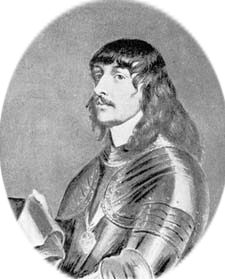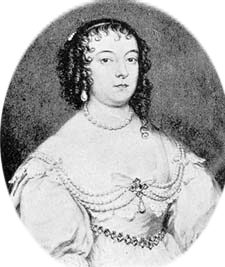James, 7th Earl of Derby, 1627-1651
 Born
1607 at Knowsley, he became Lord of Man in 1627 following the
retirement of his father from most public offices after the death of
his mother; he inherited the Earldom on the death of his father in
1642. Of all the Stanleys, he is the one in whose life the Isle of
Man played a major part. A staunch defender of the Royalist cause,
who ended his life, condemned by a Parliamentary Court Martial, on
the block at Bolton. He removed to the Island in 1643 to preserve it
as a Royalist stronghold and whilst there wrote a series
of letters to his son which give some of his motives behind his
actions and desires for the future of the Island.
Born
1607 at Knowsley, he became Lord of Man in 1627 following the
retirement of his father from most public offices after the death of
his mother; he inherited the Earldom on the death of his father in
1642. Of all the Stanleys, he is the one in whose life the Isle of
Man played a major part. A staunch defender of the Royalist cause,
who ended his life, condemned by a Parliamentary Court Martial, on
the block at Bolton. He removed to the Island in 1643 to preserve it
as a Royalist stronghold and whilst there wrote a series
of letters to his son which give some of his motives behind his
actions and desires for the future of the Island.
Whilst on the Island he attempted to move the legal basis of
insular landholdings towards a more feudal pattern, an act in which
William Christian would appear to have played a duplicitous part -
which attempt caused much discontent and was finally undone in the
Act of Settlement of
1703/4.
Much has been written about him, and William
Christian who, being held responsible for the betrayal of Castle
Rushen, was later executed at the insistence of his son Charles.
 Made
a good, and it would seem very happy, marriage to Charlotte de
Tremoille, by whom he had six children. She became famous as the
successful defender of Lathom during
an extended Parliamentary siege.
Made
a good, and it would seem very happy, marriage to Charlotte de
Tremoille, by whom he had six children. She became famous as the
successful defender of Lathom during
an extended Parliamentary siege.
References
(see also the general references to
the Stanley Family)
Espinaase Lancashire
Worthies Chap 7 - a good and readable synthesis of late
Victorian thought
Seacome 'House of
Stanley' gives much, though sometimes somewhat
hagiographic, detail of the last days of James.
J. G. Cumming The Great Stanley: or, James Seventh Earl of
Derby and his noble Countess, Charlotte de la Trimoille, in their
Land of Man : a Narrative of the Seventeenth Century is a
historical 'novel' based on his life
Madame Guizot de Witt The Lady of Latham, being the Life and
Original Letters of Charlotte de la Tremoille Countess of
Derby, London, 1869
 Born
1607 at Knowsley, he became Lord of Man in 1627 following the
retirement of his father from most public offices after the death of
his mother; he inherited the Earldom on the death of his father in
1642. Of all the Stanleys, he is the one in whose life the Isle of
Man played a major part. A staunch defender of the Royalist cause,
who ended his life, condemned by a Parliamentary Court Martial, on
the block at Bolton. He removed to the Island in 1643 to preserve it
as a Royalist stronghold and whilst there wrote a series
of letters to his son which give some of his motives behind his
actions and desires for the future of the Island.
Born
1607 at Knowsley, he became Lord of Man in 1627 following the
retirement of his father from most public offices after the death of
his mother; he inherited the Earldom on the death of his father in
1642. Of all the Stanleys, he is the one in whose life the Isle of
Man played a major part. A staunch defender of the Royalist cause,
who ended his life, condemned by a Parliamentary Court Martial, on
the block at Bolton. He removed to the Island in 1643 to preserve it
as a Royalist stronghold and whilst there wrote a series
of letters to his son which give some of his motives behind his
actions and desires for the future of the Island. Made
a good, and it would seem very happy, marriage to Charlotte de
Tremoille, by whom he had six children. She became famous as the
successful defender of
Made
a good, and it would seem very happy, marriage to Charlotte de
Tremoille, by whom he had six children. She became famous as the
successful defender of ![[Stanleys]](eandc.gif)